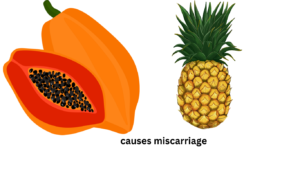This article is take a look at which foods are known to trigger miscarriage and why pregnant women should avoid them.
Pregnancy is a beautiful and delicate stage of a woman’s life, but it also comes with the added responsibility of taking additional care of one’s health.
A miscarriage is one of the most terrible pregnancy experiences.
While there are numerous factors that can contribute to a miscarriage, certain foods have been associated with an elevated risk.

Understanding Miscarriage
“A miscarriage occurs when a pregnancy naturally ends before reaching the 20th week.”
It can happen due to various reasons, such as genetic abnormalities, hormonal imbalances, or maternal health issues.
While some miscarriages occur without any specific cause, certain lifestyle and dietary factors can play a role in increasing the risk.
Foods to Avoid During Pregnancy
During pregnancy, certain foods pose potential risks to the developing fetus, and avoiding them is crucial to ensure a healthy pregnancy.
These foods include:
Soft Cheseses and Unpasteurized Dairy Product:
Soft cheeses like brie, camembert, and feta may contain harmful bacteria called Listeria, which can lead to miscarriage or severe complications in pregnancy.
Unpasteurized milk and dairy products should also be avoided for the same reason.
Raw or Undercooked Meats:
Raw or undercooked meats can harbor harmful bacteria like Toxoplasma, Salmonella, and E. coli, a bacterium that can be harmful to both the mother and the baby and may present risks during pregnancy.
Certain Seafood:
Some types of fish, such as sharks, swordfish, king mackerel, and tilefish, may contain high levels of mercury, which can harm the developing nervous system of the baby.
Deli Meats and Processed Foods:
Deli meats and processed foods may contain additives and preservatives that are not safe for pregnant women.
Caffeine:
While moderate caffeine consumption is accepted as safe during pregnancy, excessive use of caffeine may be associated with an increased risk of miscarriage.
Herbal Teas and Supplements:
Some herbal teas and supplements may be harmful during pregnancy, and their safety is unknown.
Artificial Sweeteners:
Due to the potential hazards, artificial sweeteners such as saccharin and aspartame should be avoided during pregnancy.
Alcohol:

Pregnancy consumption of alcohol is a well-known risk factor for miscarriage and a number of developmental disorders.
cautionary Notes on Spices and Herbs
While many spices and herbs are acceptable to consume while pregnant, some should be used with caution.
Excessive use of cinnamon, fenugreek, and black or blue cohosh, for example, has been attributed to an increased risk of miscarriage.
Unpasteurized Beverages
In addition to dairy products, any unpasteurized beverage, such as unpasteurized fruit juices or cider, should be avoided during pregnancy to reduce the risk of food-borne disease.
High Mercury Content Foods
Mercury can be detrimental to a baby’s growing neurological system.
Pregnant women should avoid eating high-mercury seafood and instead choose low-mercury options such as salmon, shrimp, and canned light tuna.
Extra Vitamin A
While vitamin A is necessary for prenatal growth, too much vitamin A from supplements or specific foods, such as liver, can be detrimental. Pregnant women should acquire the required dose of vitamin A from reliable sources.
Papaya and Pineapple

Certain tropical fruits, such as papaya and pineapple, contain enzymes that might cause uterine contractions and miscarriage.
It’s recommended to avoid consuming too many of these fruits when pregnant.
Conclusion
Pregnancy is a thrilling and exciting time, but it also demands special attention to diet and lifestyle choices.
Certain foods might increase the chance of miscarriage, therefore expectant mothers must be cautious of their eating habits.
Pregnant women can ensure a healthy pregnancy and lower their chances of miscarriage by avoiding high-risk foods and beverages and focusing on a balanced and nutritious diet.
.
FAQs
Is it possible for stress to induce a miscarriage?
While stress can have an impact on pregnancy, there is no evidence linking stress to miscarriage. However, stress management is critical for overall well-being throughout pregnancy.
Is it safe to drink coffee in moderation when pregnant?
Caffeine consumption of 200-300 mg per day is typically regarded as safe during pregnancy. However, it is important to seek specific counsel from a healthcare expert.
Is there anything you can eat to help prevent miscarriage?
While no single item will ensure miscarriage prevention, a healthy pregnancy is supported by a balanced diet rich in fruits, vegetables, whole grains, and lean proteins.
Can exercising raise the chances of miscarriage?
Moderate exercise is normally harmless and may even be beneficial during pregnancy. However, before beginning or continuing an exercise plan, it is critical to consult with a healthcare expert.
Miscarriages: How often are they?
Miscarriages occur more frequently than most people realize. It is believed that 10-20% of all known pregnancies result in miscarriage. However, the true figure may be higher because some miscarriages occur before a woman realizes she is pregnant.
